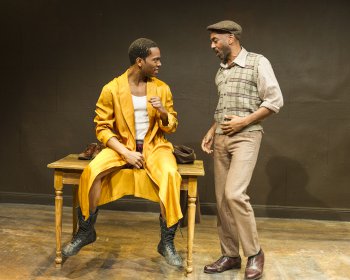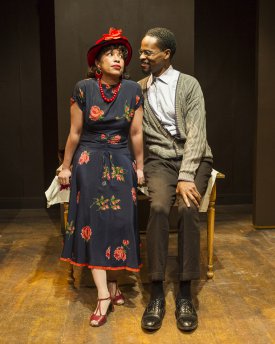Walk Hard
Hard-hitting 1939 drama of Black boxer fighting for his civil rights gets an electrifying production by director Imani.

Joshua David Scarlett and Craig Anthony Bannister in a scene from “Walk Hard” (Photo credit: Jacob J. Goldberg Photography)
[avatar user=”Victor Gluck” size=”96″ align=”left” ] Victor Gluck, Editor-in-Chief[/avatar]Imani, artistic director of the Richard Allen Center of Culture and Art, has piloted an electrifying revival of the unpublished 1944 Walk Hard by Abram Hill, now being revived at Metropolitan Playhouse. With a compelling performance by Joshua David Scarlett as Andy Whitman, an ambitious African American youth who sees the boxing game as his way to fortune in a racist America, this gritty, Damon Runyanesque play will keep you on the edge of your seat.
Walk Hard has a fascinating history. The play is based on a well-received 1940 novel called Walk Hard – Talk Loud by white author Len Zinberg, aka hard-boiled pulp writer Ed Lacy. Four years later is was adapted for the stage as Walk Hard by Abram Hill, founder of the American Negro Theater, housed in what is now Harlem’s Schomburg Center for Research in Black Culture. In 1946, producer Gustav Blum remounted the play at midtown’s 200-seat Chanin Auditorium (Lexington Avenue and 42nd Street) for a week’s run with a cast of 18. As the play was never published, it dropped from view as have the novels of Len Zinberg. It also appears to have been the last theatrical presentation at the auditorium before it was converted into office space.
When we meet Andy, it is 1939, the tail end of the Great Depression, and he is a 19-year-old bootblack with ambitions to leave America for Europe (like Josephine Baker and Richard Wright) in order to find acceptance as a person of African American heritage. Boxing promoter Mack Jeffris witnesses Andy in a street fight and offers to make his fortune in the ring. As he is underage, Andy needs the signature of his father or grandmother with whom he lives. Andy’s conservative, traditional father Charlie wants him to go to college though he can’t afford to send him, while his fiery, progressive grandmother knows how the world works and is hoping to see progress for African Americans.
While Andy rises quickly in the boxing world, he finds corruption and racism wherever he goes. He also meets those who have been devoured and used up by the system, washed-up fighters and defeated trainers. Faced with the virulent prejudice of gangster Lou Foster who dominates the East Coast prize fighting syndicate and the demands of his activist girlfriend Ruth who wouldn’t make a commitment until Andy decides on his future, our hero ultimately has a big decision to make at a young age.

Kim Yancey-Moore and Beethovan Oden in a scene from “Walk Hard” (Photo credit: Jacob J. Goldberg Photography)
Scarlett gives a strong, nuanced performance as the angry, articulate and ambitious Andy. He is always the center of attention whenever he is on stage. As his manager, Peter Tedeschi is sensitive as a man caught in the middle between his beliefs and the corrupt realities of the world he lives in. Frank Anderson is ferocious as the bigoted promoter Lou Foster. Beethovan Oden and Vanessa Shaw make an interesting contrast as Andy’s family: as his father, a porter on the railroad, Oden has become small and defeated, while Shaw as his indomitable grandmother is feisty and spirited. The colorful world of prize fighting is delineated by Chris Krause’s Italian American boxer Larry Batchelo who has a weakness for the ladies, and Michael Basile’s Mickey McGown, a washed up boxer who has a college degree.
Many in the large cast play more than one role demonstrating their versatility. Kim Yancey-Moore sparkles as Ruth’s opportunistic Aunt Susie and later appears as good-time girl Sadie, a friend of Larry’s. Sean Michael Buckley appears first as the pugnacious bootblack Bobby and then again as the Hotel Clerk who is just doing his job. Craig Anthony Bannister makes a fine impression first as a down-and-out black architect who can’t get a job, and later as Happy, Andy’s trainer who has also been beaten down by the system. Oden also reappears as a savvy black Bell Hop who knows the ground rules. Only Gabrielle C. Archer’s role as Ruth is problematic. Apparently, Ruth in the original novel was a Communist but the play produced in 1946 saw fit to change her into an early activist. As a result, her impassioned pleas to Andy do not entirely ring true and play’s ending seems like something from the Civil Rights era of the 1950’s rather than from 1939, the year the play is set.
Imani’s direction is like greased lightning and the play moves swiftly along from the moment the lights come up on the opening scene which grabs you by the throat and never lets up. The minimalist set by Alex Roe helps immeasurably for a smooth transition between the eight scenes in this three act play performed in two parts. Sidney Fortner’s costumes are a veritable fashion parade of late Depression styles from inexpensive street togs to designer clothes. Both Krause’s fight direction and Bill Toles’ sound design are also notable.
Imani’s production of Walk Hard for Metropolitan Playhouse is an exciting piece of theater from an eye-opening rediscovery. Historically, it comes nine years after Clifford Odets’ Golden Boy which covers similar content and 13 years before Lorraine Hansberry’s A Raisin in the Sun in which the Younger family fights a similar battle. Current racism condemned by the Black Lives Matter movement and much talk of income inequality in this election year make Walk Hard relevant once again at this time.
Walk Hard (through March 20, 2016)
Metropolitan Playhouse, 220 East 4th Street, in Manhattan
For tickets, call 800-838-3006 or visit http://www.metropolitanplayhouse.org
Running time: two hours and five minutes including one intermission






Leave a comment